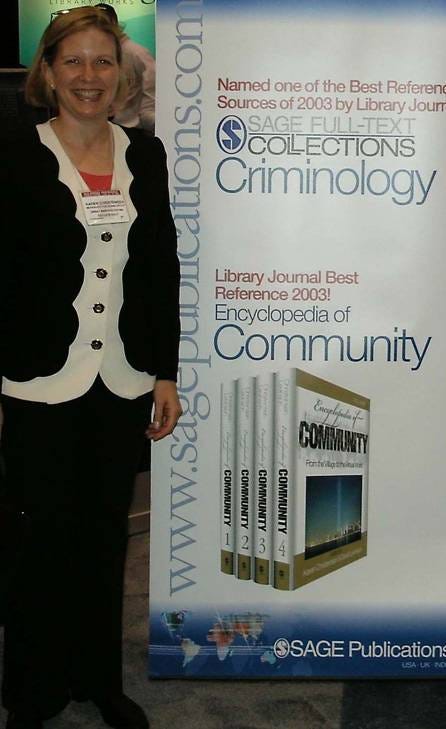As we approach a new year that is a future full of uncertainty and risk and division, I’ve been answering questions from Chinese journalists1 and, in the early hours, working on a chapter in the The Great Good Place about the idea of the public square, where everyone has a voice. Indeed, the book is about the individual importance of small venues—coffee shops and pubs and the like—but I want to show how they exist as part of, or side by side with, the larger public spaces are also essential to a vibrant civic society.
An article about civic society in Norway came to mind. I first heard of it from an anthropologist, David Levinson. He had been looking at my collection of books and journals about community. “I wonder if this could be an encyclopedia,” he said. He’d been the editor-in-chief of the Encyclopedia of World Cultures, a considerable commercial success for Macmillan, and I guess everything looked like a potential encyclopedia then. As it turned out, he was right about this, as far-fetched as it seemed. My research and the network we put together enabled us to create the Encyclopedia of Community, published by SAGE, winner of major library awards. I was the senior of the co-editors, to the confusion of quite a few people because another SAGE author, a professor at UC Berkeley, has the same name and wrote on similar issues. (In fact, I note that the SAGE website still has this error.)
During those first conversations about the project, Levinson told me about a 1984 article he’d reviewed about cooperation and individualism in Norway. The idea I took away was that conflict is reduced when members of a community have overlapping ties. I’ve used this a lot over the years because it is so easy to grasp. You might belong to different political parties, but if you play pick-up basketball together and have kids on the school soccer team, when a divisive issue comes up you’re much more likely to find common ground and show respect for other points of view.
This week I dug out my copy of the Norway article. It is credited to Grinnell College professor Douglas Caulkins, though it’s clear from the text that his wife Lorna was his collaborator - an example of #Thanksfortyping, which I’ll be speaking about in the spring.2
I see that it was anthropologists at the University of Manchester who contended that “political stability is often an outcome of cross-cutting social ties. People who are opponents in one context might be allies in another…. According to the theory, local society would be politically unstable, however, if there were pervasive cleavages between interest groups—when opponents on one issue are almost always opponents on other issues as well. In a community [or nation?] with such deep divisions, people on one side of any issue tend to treat the other side as enemies.”
Doug and Lorna Caulkins spent two years in Norway, as anthropologists do, talking to people in villages, towns, and cities, and experiencing daily life with the people they were studying.
A community was not complete without a youth group, sports club, health organization, one or two Lutheran missionary associations, and perhaps a farmer’s association and an organization for supporting coastal rescue services.… ‘In a small community like this one,’ our landlord explained, ‘everyone is expected to join at least a couple of groups.’ Anyone not wishing to join an organization risked being considered uncooperative.’
But their conclusions were not quite a clear-cut as I’ve imagined. In fact, they found that cross-cutting ties and group memberships are not the only factors in Norway’s social success. Instead, they detail certain common Norwegian values.
Regular communion with nature—through skiing, walking, or boating—is considered virtually necessary for well-being. . . . Even wealthy Norwegians with elaborate and well-furnished homes prefer simple ski huts for recreation, [usually] one-room, sparsely furnished log or board cabins without modern conveniences, often far from the nearest road.
And the Norwegian ideas about personal dignity and social position were quite different from what Caulkins knew in the United States, leading to the occasional misstep.
Individuals are not submerged within the group, but neither are they encouraged to stand out. . . . A comparison with the United States may help to clarify the point. In the widely discussed book Habits of the Heart, Robert Bellah3 and his co-authors assert that the United States has moved away from earlier forms of American individualism that combined individual responsibility with concern for the public good. Instead, they argue, American culture has come to emphasize self-indulgent forms of individualism centered on either self-realization (“expressive individualism”) or maximization of material benefits and power (“utilitarian individualism”). The result, according to Bellah, is a regrettable decline in Americans’ commitment to the welfare of others. Expressive individualism encourages self-absorption while utilitarian I individualism encourages competition, producing winners and losers in a zero-sum game (“your loss is my gain”). Norwegian individualism, in contrast, underscores the importance of individual integrity and dignity, in a non-zero sum environment.
… I was again with Tor, watching his youngest son, Bjorn, experiment with his new skis. I lapsed into my American mode and laughed affectionately when Bjorn took a harmless but amusing tumble. Bjorn was clearly insulted and shot me a look that left me with no doubt that I had been very offensive. Clearly, respect for individual dignity was not reserved just for foreigners or adults.
Here I have to stop and ask you to notice something. You’ve been reading text from a peer-reviewed, academic article, yet it’s understandable, isn’t it? Clear English, no jargon. This is possible! (It’s one of my causes in life, to get academics to communicate what they know, from years of study and reflection, in a way that makes sense to the general reader. It’s hard going.4)
Norway continues to rank higher than the United States in terms of quality of life, but it too has dealt with considerable change. It is now drastically increasing its defense spending because of Russia aggression. Like other European countries it has to grapple with immigration. Even in 1984, Caulkins pointed out that Norway was very homogeneous, and that diversity would present challenges.
It continues to take a lead in terms of climate change and adaptation. That’s nothing new. It was a female Norwegian prime minister, Gro Harlem Brundtland, whose name became shorthand for the 1992 report that was then published a book called Our Common Future.
“Knowledge for our common future” is the tagline of my company, Berkshire Publishing Group. Finding common ground is our task at the moment, at the same time facing up to genuine threats, at home and abroad. That balancing act is not easy. Of course there will be unpleasant subjects that need attention in The Way We Live Now in 2025, but I promise to balance that with good cheer and good company, good ideas and practical tools that we can use to make this world a better plac
Wishing you and yours a fruitful, convivial New Year!
Snow, gentlest of the planet's water elements,
makes beauty as it falls. In woodlands, it shows
us the essential shape of every tree. In the city,
it makes each roof distinct and creates
a harmony of shapes and patterns. Snow brings
us a vital gift: the sense of wonder.
My son Tom took this photo in Beijing in 2009, a long time ago when things felt more hopeful. Nonetheless, China has been on my mind a lot, as I correspond with friends there and answer questions from journalists about the future of US-China publishing. Who knows what 2025 will bring for Berkshire in China?
I was happy to be asked to talk about #Thanksfortyping at the Mason Library on April 24th. I’ve written quite a lot about this but not for a couple of years. Here’s the Copyright Clearance Center podcast from 2019 about the Oxford conference where I first talked about “Jumped-up Typists.”
One of the emails about the Encyclopedia of Community I prize was from Robert Bellah. “Dear Karen: Thanks for sending me your introduction. I have gone over it quickly and find it excellent, consistently intelligent and even-handed, neither pollyannaish nor cynical—hard to do. You have cited all the most central people and used them well. I am grateful for the reference to Bill McNeill’s latest book. He is so amazingly productive and he must be ten years old than I am. A model. I hope and expect that the encyclopedia will be well received. Best, Bob.”
I’ve recently published a book, Women: A World History, that is exemplary in this regard, even though the subject might easily lend itself to insider-speak and slogans. Take a look - I’m making the ebook free for the next couple days and it’s inexpensive, at the author’s request, in any case.








We share a lot in common. See link to my book, Donn Tilson
https://journals.sagepub.com/eprint/RZTDQFNHRPSBESUSCJS2/full